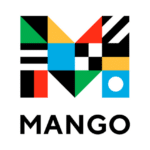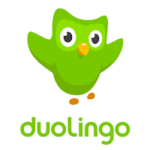
5 Babbel Alternatives That Also Focus on Bite-Sized Lessons
There are plenty of terrific Babbel alternatives on the market.
Don’t get us wrong; Babbel has a lot to offer.
The program aims to help you quickly develop language skills through realistic conversation examples, with the speech recognition technology giving you the valuable speaking skills you need. (See our full Babbel review here.)
That being said, Babbel isn’t the be-all and end-all when it comes to language learning, and there are lots of alternatives that may better fit your needs.
The five Babbel alternatives below are definitely worth a look.
Contents
Download: This blog post is available as a convenient and portable PDF that you can take anywhere. Click here to get a copy. (Download)
Best Babbel Alternatives
1. Duolingo
Duolingo has a lot of features that are similar to Babbel, and guess what? You don’t have to pay for Duolingo unless you want to unlock special material.
One way Duolingo is like Babbel and FluentU is that it offers flexible time commitment. However, while Babbel gives you 10-15 minute blocks, Duolingo lessons usually only take around 5 minutes, so Duolingo may be perfect if you don’t have the time to commit to Babbel. But like Babbel and FluentU, you can also use Duolingo for longer stretches of time whenever you want.
Duolingo also gives you speaking practice. You can record words and phrases and compare them against the audio example. However, if you don’t want to speak at the moment, you can also opt out of this option.
Duolingo uses plenty of example sentences to help you learn words in context. And since words are frequently reused in different examples, you’ll get to see how a word may be used in more than one context.
Duolingo offers over 20 languages, so you’ll have over twice as many language options as Babbel.
Compared to Babbel, Duolingo’s main weakness is that it doesn’t have example conversations. However, if full conversations aren’t your thing, Duolingo may be an ideal alternative to Babbel.
https://www.fluentu.com/blog/does-duolingo-work-review/
2. FluentU
FluentU also focuses on conversational language and realistic examples, but as an added bonus, it does so through authentic videos—the same stuff native speakers watch.
Whatever your interests or goals are, this app has a large variety of native content to choose from. There are music videos, movie trailers and clips, vlogs, interviews, news segments, catchy children’s songs, snippets from animations and much more. But authentic content can be difficult to follow and learn from, so FluentU aims to make the learning process easier by embedding learning tools into each video.
Before you watch, you can check the word list and transcript for a preview of what to expect.
The subtitles are interactive, allowing you to check the contextual definition of any word without leaving the video player. You can also add words to flashcard decks and see them used in other videos in the FluentU media library.
The learning continues after the video’s over, too: A custom-made quiz follows each video with highlights from the vocab used in the video, as well as opportunities to translate key moments.
3. Mango Languages
Mango Languages has a lot of the features Babbel users love.
For instance, this program also uses realistic example conversations to teach vocabulary and give learners conversational skills.
And the Mango Languages recording feature allows you to record your own pronunciation and compare it head-to-head against a native speaker’s pronunciation, giving you the opportunity to perfect your accent.
Plus, with over 70 language options, you’ll have way more languages to choose from than Babbel offers. So if Babbel doesn’t offer the language you want to learn, Mango may be the course to check out.
While there’s a free trial, a subscription is required for additional lessons.
https://www.fluentu.com/blog/mango-languages-review/
4. HelloTalk
If your favorite Babbel feature is the conversation-based learning, HelloTalk could take your language skills to the next level.
That’s because HelloTalk is also conversation-based. However, rather than simulating realistic conversations, HelloTalk provides you with real conversations with native speakers, allowing you to learn vocabulary in a completely authentic context. And since the app offers translations and corrections, your language skills don’t even have to be close to perfect to start using HelloTalk today.
And, HelloTalk supports over 150 languages. Good luck finding a language you can’t practice through HelloTalk!
The basic service is free, though additional purchase options can allow you to learn more languages, search based on more traits and unlock more translation tools.
https://www.fluentu.com/blog/hellotalk-review/
5. Hello-Hello
Available: iOS
Like Babbel, Hello-Hello aims to prepare you to read, write, speak and listen in your target language.
Hello-Hello has a similar conversational focus to Babbel. Words and phrases are presented in realistic conversational contexts to give you an idea of how to actually use what you learn. Plus, you can record yourself speaking to check your pronunciation.
Hello-Hello offers 13 languages, which largely overlap with Babbel’s offerings.
While the app download is free, you must purchase a license to use the app. However, since this is a one-time fee, if you’re planning on using the app for a long time, it may be more affordable than Babbel.
Why Try a Babbel Alternative?
One reason you might want to try a Babbel alternative is the cost of the program. Most of Babbel’s materials are only available with a subscription, but if your learning budget is limited, this could be prohibitive. Luckily, there are plenty of different options available, including free language learning websites.
You might also want to try a Babbel alternative if you love trying new things. There are so many innovative apps and websites out there, and you never know which one will be your new favorite. Not only do you get the thrill of trying new options, you might also find a learning program that turns out to be your ideal match.
Babbel isn’t meeting all your needs or wants. Whether you’re not learning fast enough, the interface isn’t your favorite, the price is too high or you need a program that focuses on different skills, Babbel might just not be right for you, and that’s fine!
So if you’re looking for an alternative to Babbel, try out these five options.
They could just be love at first sight!
Download: This blog post is available as a convenient and portable PDF that you can take anywhere. Click here to get a copy. (Download)






